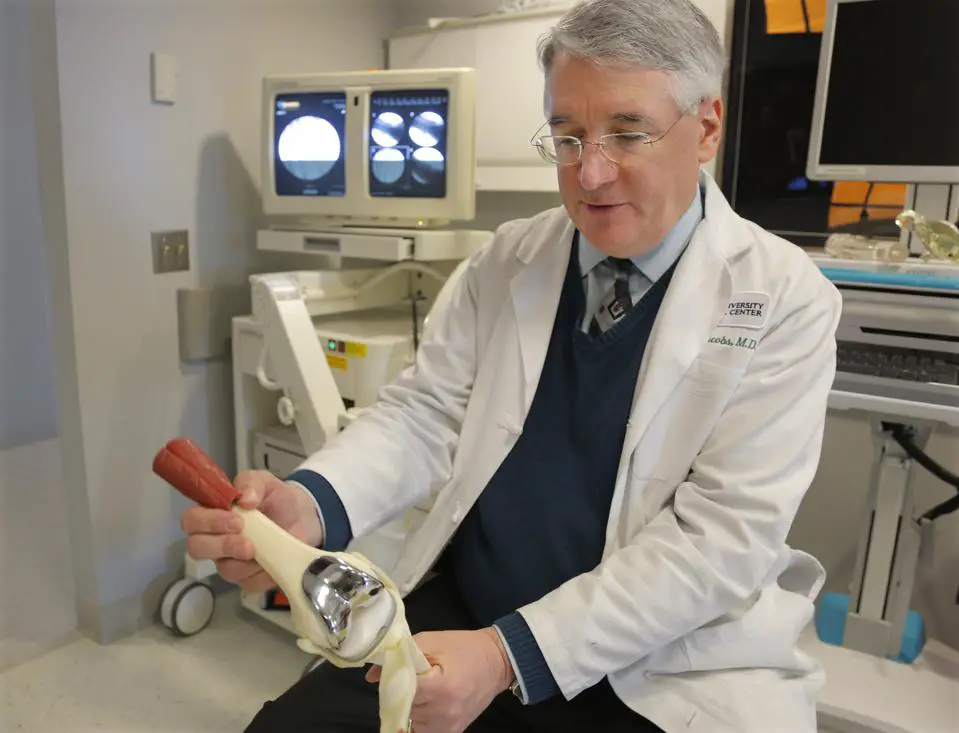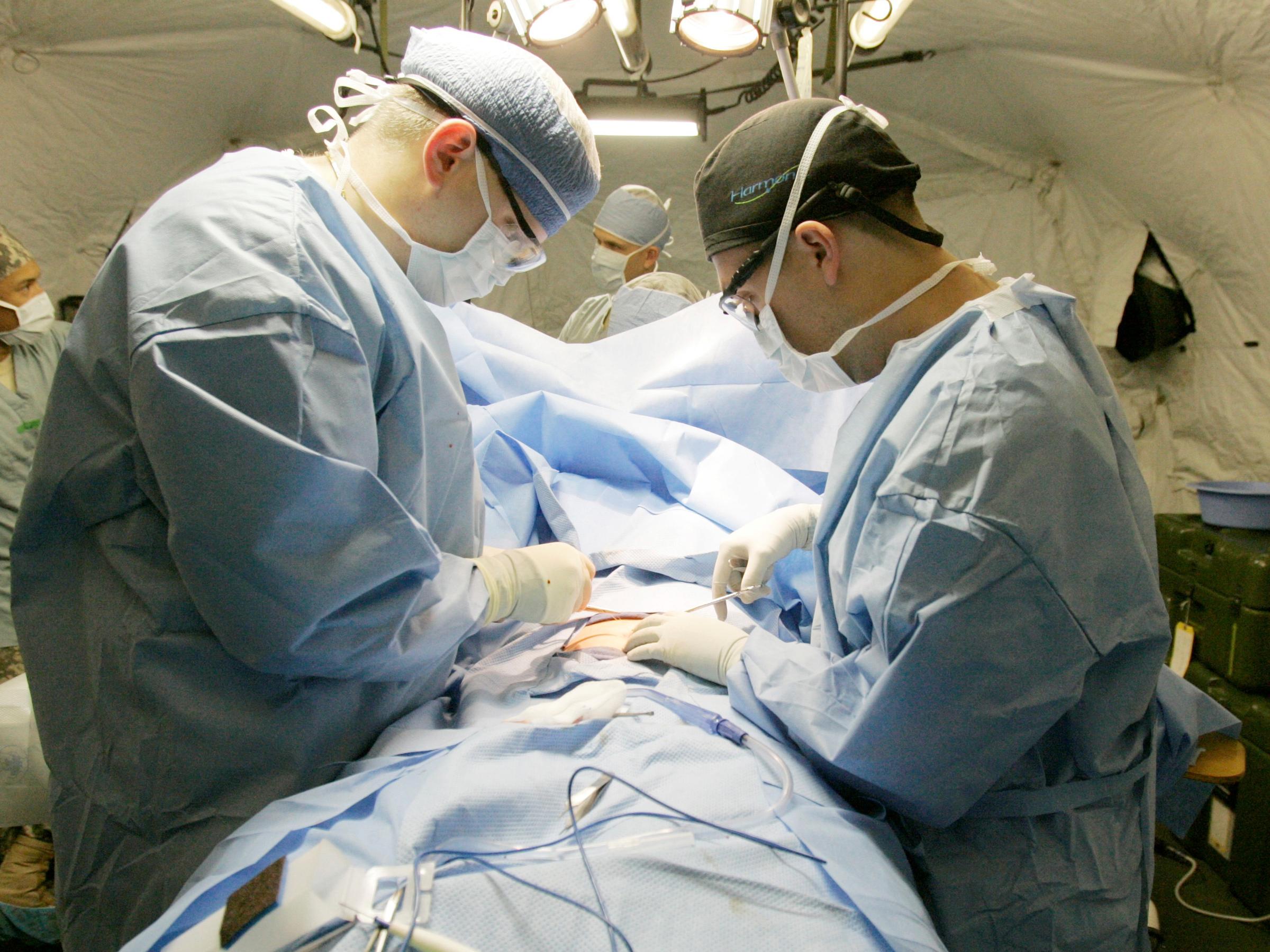Medicare Coverage For Parts A And B
At present, Original Medicare Parts A and B pay for certain costs of knee replacement surgery provided the procedure is deemed medically necessary by the doctor. Part A would cover the expense of the hospital stay while Part B would cover out-patient and recovery services mandated by the physician.
Patients would have to pay Part B deductible and 20% of the co-insurance fees.
Medicare Part C would provide the same coverage as Medicare Part A and B and additional coverage for certain services. If you anticipate knee replacement surgery in the future, can explore Part C plans for better coverage.
Antibiotics, anticoagulants, and painkillers prescribed by the doctor following knee surgery would be covered by Medicare Part Ds prescription drug program or Medicare Advantage Prescription Drug policy.
Patients should check the costs of the procedure and the extensive aftercare that involves pain medications and physical therapy.
Medicare Part D Prescription Drug Plans
Medicare Part D prescription drug plans are sold by private insurers. Since Medicare Part A only covers medications you receive while in the hospital, a Part D plan can help cover the costs of prescription medicines you may need after your knee or hip replacement.
Examples of Joint Replacement Medications Covered by Medicare Part D Plans
- Antibiotics to prevent or treat infection
- Anticoagulants such as warfarin
- Anti-inflammatory drugs
- Pain medicine such as NSAIDs and acetaminophen
Are There Limitations During The Recovery Process
Recovery time can range from two to six weeks, and some physicians may recommend that you work with a physical therapist who can help you maintain or build up your range of motion and strength. Depending on the patient’s hip strength and mobility, they may want to consider arranging for a family member to help with daily activities and errands or at-home care.
Recommended Reading: How To Change From Medicare Advantage To Original Medicare
Bundled Payments Focus On Quality
The new CMS bundled payment model will focus on the quality of care more than the quantity.
The CMS will continue to pay surgeons, physical therapists, rehab facilities, and others involved in patient care separately for each service.
However, the CMS will also track the overall cost of patient care provided by hospitals, surgeons, nursing homes, and home health agencies for up to 90 days after the start of care.
If this bundled cost falls under a target price the CMS sets for each hospital, the CMS will pay the hospital a bonus.
However, if patients have complications or end up staying longer in the hospital or rehabilitation facility, hospitals could have to pay back part of that bundled payment to Medicare.
These changes will not affect all hospitals in the country.
Quality Vs Cost Control

Although cost garners the most attention, its not necessarily separate from quality of care.
should also have an impact on quality, said Mueller, because you start being more careful how youre measuring the outcomes of a hip replacement or a knee replacement.
Hospitals receive a set amount for the overall care of a patient. The CMS hopes this will encourage more mindfulness on how hospitals approach these procedures.
Its really more the carrot than it is the stick, said Mueller, because you are changing from incentives to simply do more to do more to doing the optimum and doing the right thing and getting paid for that.
With a strong financial incentive, hospitals may steer patients toward post-surgery care that is both high quality and cost effective.
Like the previous payment model, bundled payments could have unforeseen ripple effects.
Hospitals may buy up post-surgery care facilities to give them greater control over patients recovery leading to more consolidation in the healthcare system.
Thats not the only option, though, for hospitals to survive this shift.
There are other ways besides consolidation into a big system with single ownership, said Mueller. can do it by affiliation agreements. They can do it by working with care coordinators, whether or not those coordinators are part of their own system.
Hospitals may also stop performing hip and knee replacement surgeries on people who are more likely to make poor recoveries.
Don’t Miss: Who Pays The Premium For Medicare Advantage Plans
Important Things To Consider
Given the complexity of the surgery, we can expect a significant loss of blood during the operation, as well as postoperative bleeding discharged on the drainage tube.
As with any major surgery involving general anesthesia, there is also a low risk of stroke, heart attack, pneumonia, and blood clots.
Preparation for surgery is as important as postoperative recovery because it ensures the success of the intervention and the complete recovery of mobility and joint stability. It starts 2-3 months beforehand and is done through physiotherapy which aims to increase the muscle tone and mass, increase the joint amplitude, increase the stability and mobility of the hip, stimulate circulation and lymphatic drainage, prepare the opposite leg for the period of overload.
After the surgery, you have to walk daily. Initially in small steps over short distances several times a day, then gradually increase the walking time and distance.
Medicare Hip Replacement Costs With Medicare Part A
Medicare Part A is hospital insurance. This Medicare coverage helps pay for a semi-private room, meals and nursing care during your stay.
Part A will only cover a private room if your doctor says its medically necessary or its the only room available.
Medicare hip replacement reimbursement includes skilled nursing care after your surgery. Part A helps cover the first 100 days of in-patient care including physical therapy.
The Medicare Part A deductible can apply, and you may be responsible for copays or coinsurance.
Recommended Reading: Does Medicare Pay For Physical Therapy After Knee Surgery
What Else Do You Need To Make Your Decision
Check the facts
- Sorry, that’s not right. Most people with hip pain can try other treatments like medicine and physical therapy before they have hip replacement.
- You’re right. Most people with hip pain can try other treatments like medicine and physical therapy before they have hip replacement.
- It may help to go back and read “Get the Facts.” Most people with hip pain can try other treatments like medicine and physical therapy before they have hip replacement.
- You’re right. People who have had hip replacement usually have much less pain than before surgery, are able to return to their daily activities, and have a better quality of life.
- Sorry, that’s not right. People who have had hip replacement usually have much less pain than before surgery, are able to return to their daily activities, and have a better quality of life.
- It may help to go back and read “Get the Facts.” People who have had hip replacement usually have less pain than before, are able to return to their daily activities, and have a better quality of life.
1. How sure do you feel right now about your decision?
How Many Cortisone Shots Will Medicare Cover
Beneficiaries needing cortisone shots may have coverage for three cortisone shots annually. Repetitive injections may cause damage to the body over time.
Therefore, many orthopedic surgeons suggest such a low number for each patient per year. Part B pays for the administration of any cortisone injections if a healthcare provider administers the drug.
Recommended Reading: Does Medicare Cover Urgent Care Centers
How Long Is The Recovery Time For Hip Replacement Surgery
Typically, patients return to normal life activities within one to six months. The most discomfort ordinarily comes after surgery where you’ll probably feel some pain but will receive medication to ease the discomfort. 24 hours after surgery you’ll be given exercises and a walking aid, such as a stick, to get you moving and begin strengthening the muscles around the hip.
Short-term recovery involves getting off painkillers and managing to sleep without discomfort. You’ll find you’re on the road to recovery when you no longer need any walking aid and can move about the house without pain. It usually takes around four to six weeks to get to this stage of recovery.
Long-term recovery is when you can return to work and do normal, daily activities. You should also find that surgical wounds and soft tissue have healed, generally feeling normal again.
What Does Hip Replacement Surgery Involve
There are two types of hip surgery: anterior, where an incision is made at the front of the hip and posterior, where the incision is on the side. Each surgery has a slightly different procedure:
Anterior:
Posterior:
Read Also: Do You Have To Be To Get Medicare
What Are The Risks Of Total Hip Replacement Surgery
All surgery has risks, such as complications from anesthesia. And after any major surgery, there is always a small chance of a blood clot or a heart attack.
With total hip replacement, there is also a small risk of infection or hip dislocation. And some people, over time, may have other problems. These include the feeling that one leg is longer than the other, loosening of the parts of your new joint, or sensitivity to metal. If you are allergic to certain metals, tell your doctor.
Pain relief with surgery
- The evidence about hip replacement surgery suggests that most people are happy with the results.
- Take a group of 100 people who have the surgery. Six months after hip replacement, about 90 out of 100 people have less pain and can do more activities than they could before surgery.footnote 1
Need for repeat surgery
- Most artificial hips last for many years. But they can wear out or have other problems. Some people have to repeat the surgery to have the joint replaced again.
- Take a group of 100 people who have the surgery. Within 15 years after the surgery, 10 out of 100 will need to have the hip replaced again. More than half of hip replacements last for 25 years or more.footnote 3
Problems after surgery
The evidence suggests that, like most surgeries, hip replacement may have some risks.
Your doctor might recommend hip replacement if:
How Much Does Medicare Pay For The Surgery

The American Association of Hip and Knee Surgeons reports that the price of hip replacement surgery in the U.S. can be $30,000112,000. The hip implant costs about $3,00010,000, and the overall cost also includes staff and surgeon fees. The average surgeon reimbursement from Medicare for this surgery is $1,3751,450, according to the AAHKS.
Generally, the amount that a person with Medicare pays depends on whether they have met deductibles and premiums. A doctor can give more specific information about the cost to expect.
The annual deductible for Medicare Part A is $1,484, and for Part B it is $203. Most people do not pay a premium for Part A, and for Part B, the standard monthly premium in 2021 is $148.50.
Medicare part A usually pays 100% percent of the remaining costs after a person meets the deductibles and premium. Medicare Part B pays 80%. This leaves the person to pay the remaining 20% plus their deductibles and premium. A person can check whether they have met their deductibles here.
You May Like: Is Pneumonia Shot Covered By Medicare
How Long Do Stem Cell Injections Last
This can be influenced by a variety of factors. To make things simple at DVC Stem, our stem cell clinic in Grand Cayman, we inject over 300 million mesenchymal stem cells intravenously . Currently DVC Stemâs treatment protocol does not call for a specific re-treatment period. If patients are happy with the results, no other treatment is necessary. We do have patients return to us on an annual basis voluntarily to maintain sustained benefit.
Key Points To Remember
- Most people can manage osteoarthritis pain with medicine, exercise, physical therapy, and weight loss . If these things don’t work, then surgery to replace the hip is an option.
- Arthritis may get worse over time. But it may stay the same or even get better.
- Most people have hip replacement only when they can no longer control pain with medicine and other treatments and when the pain prevents them from doing daily activities.
- People who have this surgery usually have much less pain than before. And they can usually return to activities they enjoy.
- Most artificial hip joints last for about 15 years. But this can depend on how much stress you put on the joint and how well your new joint and bones mend.
- If you wait so long to have a hip replacement that you have already lost much of your strength, endurance, and ability to be active, then after the surgery you might have a harder time returning to your normal activities.
Don’t Miss: What Is A Medicare Supplement Plan N
Do I Need To Stay In Hospital Or Can I Go Home The Same Day
With most patients having arthroscopic ACL , Shoulder Reconstructions and Arthroscopic Rotator Cuff repairs, day surgery is offered. We will usually book an overnight bed in any case, but if the patient is comfortable, they can usually leave on the day of surgery. If the surgery is done late afternoon, we would suggest staying the night.
Does Medicaid Cover Hip Replacement Surgery
As long as the hip replacement surgery is deemed medically necessary, Medicaid will cover some of the costs. The exact amount of coverage will vary depending on your plan’s details but generally Medicaid will cover evaluation appointments, diagnostic tests, surgery fees, postoperative hospitalization, and postoperative physical therapy appointments.
Don’t Miss: When Can I Change Medicare Advantage Plans
Does Medicare Part B Cover Hip Replacement Costs
Before you have a hip replacement, you will need various examinations, according to the Mayo Clinic. You may need a general physical examination to make sure youre healthy enough to undergo surgery as well as an examination of your hip. You also may need blood tests, X-Rays, and an MRI. Medicare Part B generally covers most of these outpatient medical costs.
Medicare Part B may also cover outpatient physical therapy that you receive while you are recovering from a hip replacement. Medicare Part B also generally covers second opinions for surgery such as hip replacements.
You generally pay 20% of the Medicare approved amount for these services and the Medicare Part B deductible applies.
What Are Some Disadvantages Of Robotic Surgery
While robotic surgery offers many benefits, there are some potential disadvantages to the procedures that should be considered when determining treatment plans. Robotic surgeries tend to be more time-consuming than traditional surgeries due to the use of robotic arms and the detailed precision required for each procedure. If complications arise during a robotic procedure, a surgeon may be required to start over with a traditional, open procedure.
While uncommon, robotic arms and computer equipment may malfunction during surgical procedures, which can lead to delays. In some cases, robotic surgery has been associated with nerve compression and nerve damage, which may result in long-term effects.
Also Check: Does Medicare Cover Ear Cleaning
Medicare Hip Replacement Scenario
To better understand how everything works together, lets take the real-world example of a 75-year-old man who has osteoarthritis.
Hes been working with his doctor to manage his symptoms, and things have been going well. One day, the man takes a nasty fall and breaks his hip. This mans Medicare hip replacement process involves several steps:
Considering Surgery In A Private Hospital

If you are uninsured and would like to consider surgery in a private hospital, please contact Mr Pais rooms. We will only be able to provide you with a formal quote after your consultation. This is because Mr Pai will need to determine the need for surgery, the type of surgery and its complexity before providing you with an accurate quote. To do this, he will need to take a history, perform a clinical examination and review your imaging findings.
By Lisa Rapaport, Reuters Health
5 Min Read
Medicaid, the U.S. health program for the poor, pays far less for common surgical procedures in many states than does Medicare, the federal insurance plan for the elderly, according to a new study.
Some of the discounts are so steep that they may threaten access to care, the authors argue.
Medicaid is the biggest public health program in the U.S. and currently accounts for about $1 out of every $6 spent on medical care. Medicaid expenditures also represent almost half of all federal funds spent by states.
When Medicaid fees are too low relative to payments from Medicare, doctors may refuse to treat Medicaid patients, potentially making it much harder for poor people to get treatment, argue Dr. Charles Mabry of the University of Arkansas in Little Rock and colleagues in the Journal of the American College of Surgeons.
SOURCE: bit.ly/1PJXVFa Journal of the American College of Surgeons, online January 13, 2016.
Recommended Reading: What Are All The Medicare Parts